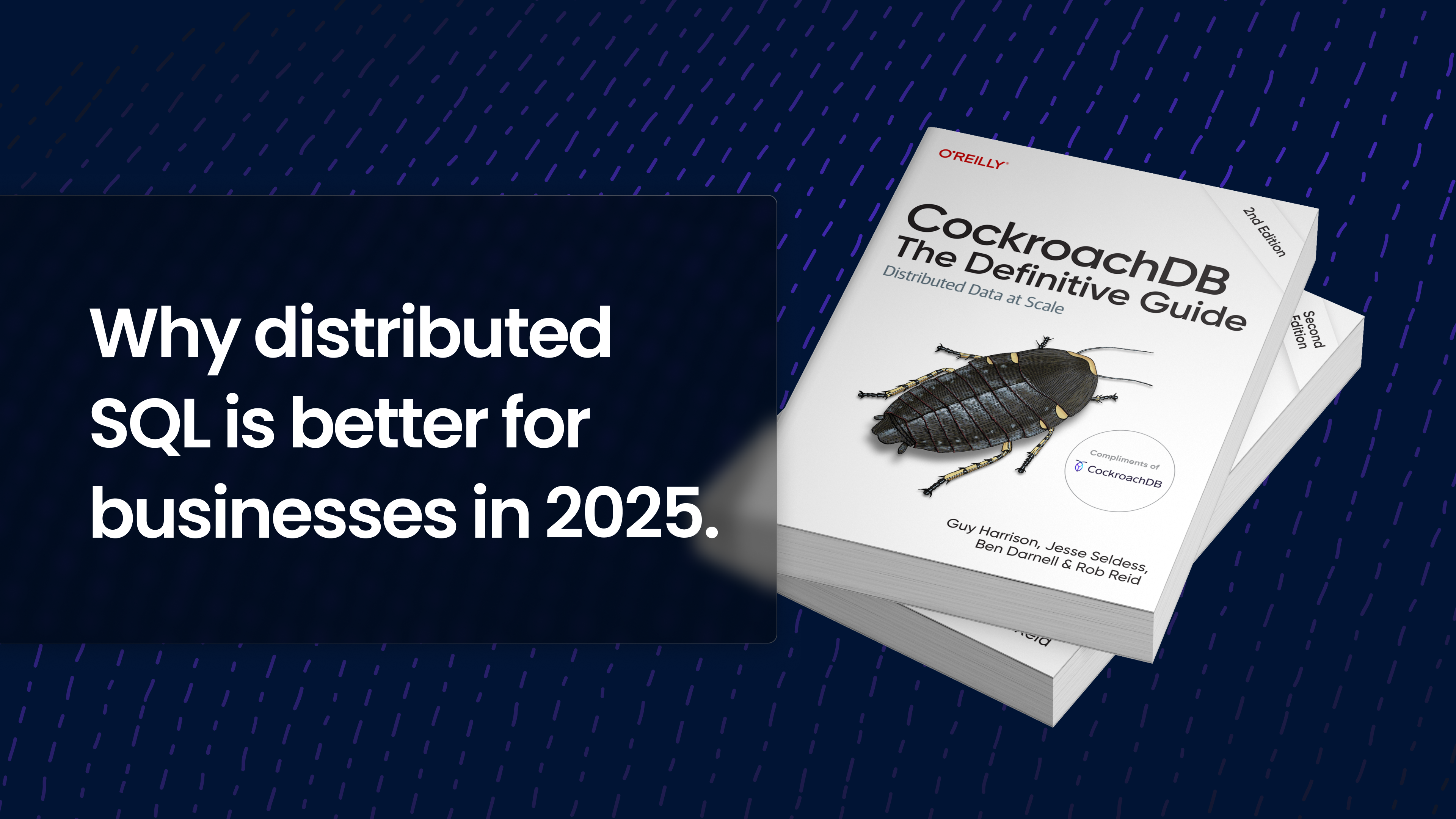Like a Stage II rocket, RoachFest 2024 is firing UP with the second of three events. Our next is poised to land in London on June 27th, marking the first-ever UK edition of Cockroach Labs’ leading event for application owners, data architects, database administrators, engineers, and operators.
With our well-attended Menlo Park event in the books, and the New York City event happening on September 26, RoachFest has seen a major expansion for 2024. It’s the optimal outing for IT professionals who are already running their data-intensive workloads on CockroachDB, or are simply seeking the latest developments in enterprise-grade distributed databases. Sharpen your skills at RoachFest with expert speaker tracks, breakout sessions, networking – followed by a cocktail hour, of course!
One Roacher that’s really ready: Rob Reid, our London MC. As Technical Evangelist for Cockroach Labs, Rob has a wide view of the data landscape. In this Q&A, he previews what’s new at RoachFest 2024, why data is more dynamic than ever, and the extra energy inherent in learning IRL.
If you met a data architect at a party and they said, “What is RoachFest?”, what would you tell them?
First, I'd probably have to start by explaining why we are called Cockroach Labs, and then we'd have a laugh and the ice would be broken!
I would say RoachFest is the place to go if you want to talk about distributed SQL databases. If you want to hear from the people who created the first publicly available distributed SQL database, RoachFest is where you should start.
I’ll play devil's advocate for a second and ask, “Why is it important that CockroachDB was first?” What kind of edge does that give to users?
Traditional SQL databases have been around for about 40 years, but for a long time they had never solved the problem of consistency at scale. The Google Spanner white paper was published in 2012 and we came out in 2015 – however, it wasn’t until 2017 that Google Spanner actually launched. So we beat Spanner to market, after their white paper came out describing what a distributed SQL database should be able to do.
I think it's a monumental achievement that we were the first database to rewrite the rule books. Before CockroachDB you could either have consistency or you could have scale, but you could not have both: That wasn't enough for our founders, and it's not enough for our database. You have to have scale and you have to have consistency.
So what being first gives our customers is leadership. Cockroach Labs might not be an old company, but we are the thought leaders in distributed SQL.
What makes RoachFest a unique event? Why should a data architect, DBA engineer or operator attend?
You get to speak to the people who work on the database itself and you get to speak to customers. You get to speak to the developers at those companies who are using CockroachDB. For example, if I were a senior architect I might get to speak to other senior architects and learn from them.
We want to create this ecosystem of learning. It’s a positive cycle where we learn from the people who attend, while in turn they learn from us and the other people who are using CockroachDB in production.
Rob Reid is Technical Evangelist for Cockroach Labs.
Keeping Pace with Global Data
What kind of insights are data and application developers looking for in 2024, to get an advantage for themselves and their organizations?
First off, there's a lot of things that people don't want to necessarily have to go out and learn, but it’s important that they do. For example, regulatory compliance: The whole ecosystem of regulations is changing. In the EU there's DORA, the Digital Operational Resilience Act, and that tells businesses what the minimum legal requirement for digital resilience looks like. So businesses are scrambling to get the reins of their data and understand how they can gain data resilience.
Now, if you are operating with a traditional SQL database with one write node or even a cloud service provider database with one write node, you don't have that resilience. I think we're at a critical point now where we are going to see a lot of the industry move from traditional databases with manual sharding in order to gain a semblance of the horizontal scalability you’d get with a distributed SQL database.
Now is the time to switch, and RoachFest is going to help the industry move because we have some of the world's biggest investment banks, customer consumer banks, and payment service providers all using CockroachDB and they're using it for a reason. Attendees of RoachFest will have the opportunity to learn from those people.
Following up on that, why is there increasingly rigorous regulation around privacy, security, and data sovereignty? Why is this becoming more and more important?
Because it's never been easier to create a global-facing application. Accessibility to data is at our fingertips, whereas it hadn't been like that before. The digital world has never been as small as it is now – you can have a video call with someone on the other side of the planet.
On a darker note, personal information to identify us is floating around all over the place. It's being scooped up by organizations, it's being bought and sold. The governments of every nation are trying to get a grip of that situation. They’re recognizing, “The information of our citizens is now everywhere, and it's never been easier to get data from them.”
For instance, a 2020 legal case against Facebook [now Meta] made it even more difficult for data to be moved physically out of the EU to the United States based on the then-existing legal frameworks – and this is just one border transfer. There'll be loads of other regulations around the world forbidding data transmission without prior consent from the user.
So we are getting into a position where, yes, the world has never been smaller digitally. But it's also never been more restricted in terms of what you can do with data and how you can obtain it.
There are many aspects of the ecosystem that deal with data transmission. Where does the database specifically have to be ready for these challenges?
To answer that, think back to 2014, the year before CockroachDB launched: If you wanted to have a global presence in any vertical back then, you had to have separate infrastructure to store that data wherever you were. I was in this world when I worked in retail, so I was managing 17 disparate instances of the same application, across 17 geographical regions, each with different applications, databases, configurations, and payment providers. It was a nightmare.
The database has historically been the hardest thing to scale, and now it's the most restricted thing in terms of where data can physically reside. So having a layer that looks after your data, that pins data for you and takes that stress from the user/developer of the application, allows them to focus on the interesting problems of providing value to their customers.
As a software engineer by trade, I don't want the team I work in to have to worry about data sovereignty. Instead, I want to provide every application with one connection string, and I want the database to figure the rest of it out.
Scaling Distributed SQL, Multi-Cloud, and More
Shifting gears, what’s a memory you have of last year's RoachFest that encapsulates what this event is all about?
One of my favorite presentations from last year’s conference is the one by Spreedly Senior Software Architect Scott Traver, “Migrating from Chaos to Consensus.” He explained not only how CockroachDB helped their payment platform replace its legacy database infrastructure, but also how it helped simplify their architecture and overall engineering organization. RoachFest 2024 will deliver many more fresh insights, from successful scaling to multi-cloud strategies and beyond.
In what way has RoachFest 2024 leveled up? How will this be a new experience for someone who may have attended last year, and is trying to decide whether to attend again this year?
We're going to hear from different customers at RoachFest 2024, so attendees will get fresh insights from people they haven't spoken to before. We are going to have some repeat guests, but the content is going to be very different.
For example, I'm running a fireside chat with a major bank where topics that we’ll cover include best practices on how to run distributed SQL, any pitfalls that people need to be aware of, know-hows of running CockroachDB and distributed SQL in general at scale. Attendees will be learning things like how to scale up a database in a public cloud, and how to run a database across multiple clouds – we’re going to get some good multi-cloud insights at this year's RoachFest!
Since regulations are always changing, RoachFest’s content is also changing in step. DORA wasn't discussed as in depth last year as it will be this year. Several of the questions that I'll be asking during the fireside chat are going to probe into how distributed SQL helps with things like DORA.
We're also going to be doing an architectural whiteboarding session in London: Users who have data challenges can speak to us – we will whiteboard their architecture and show how CockroachDB can simplify it.
Data=Dynamic
Rob, is it safe to say that the database sector is a dynamic field? Are things constantly changing that application developers must be on top of from year to year, when it comes to database knowledge?
I think where there's been a lot of movement is distributed SQL, and that's out of necessity. The business world is recognizing that monolithic traditional database management systems don't cut it anymore. There's a lot of competition in the market, and that's a very good thing: It validates the distributed SQL model, and shows that the need is there.
As a result of this, we're seeing a lot of positive volatility and changes to databases. That’s why data professionals are constantly seeking new best practices, tools, and technologies that can help reduce the operational overhead on their teams.
Last question: What's the extra dimension that comes with learning and networking in real life that you can't get any other way?
When you’re meeting people in person, everything seems more serendipitous. You meet people, you have conversations that you wouldn't have had otherwise. You connect with people you might not have met at a virtual event. I always come away from an IRL conference with renewed energy and inspiration.
I would encourage people to go to an event like RoachFest simply to meet people and to learn from them. I think if you go in with the right mindset of humility and curiosity, you are going to come away much better for it.
Thanks for all of these insights, Rob! Is there anything else we haven't discussed that you want to bring up?
I'm MCing in London, so I'm looking forward to engaging with everyone. If it's anything like Cockroach Connect in London earlier this year, it's going to be an amazing event. That environment was so rife with learning that I already know RoachFest is going to be enormously valuable to people. I'm really excited about MCing RoachFest 2024 in London, and I'm looking forward to meeting everyone.
Visit here for the full agenda and to save your spot at RoachFest 2024 in London.






